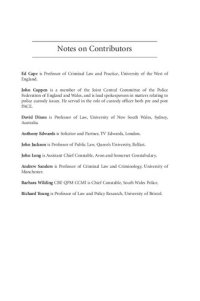
Ebook: Regulating Policing: The Police and Criminal Evidence Act 1984: Past, Present and Future
Author: Ed Cape, Richard Young (editors)
- Year: 2008
- Publisher: Hart Publishing
- Language: English
- pdf
The Police and Criminal Evidence Act 1984 (PACE) was an innovative and controversial attempt to regulate the investigation of crime. Two decades on, it now operates in a very different context than in the mid-1980s. Whilst legal advice has become established as a basic right of those arrested and detained by the police, the police service has become increasingly professionalised but also increasingly driven by government objectives and targets. The Crown Prosecution Service, originally established to separate prosecution from investigation, is now becoming involved in the investigative process with the power to make charge decisions.
Although the basic structure of PACE has survived, almost continual revision and amendment has resulted in a markedly different creature than that which was originally enacted. In 2007 the government embarked on a further review of PACE, promising to ‘re-focus the investigation and evidence gathering processes [to deliver] 21st century policing powers to meet the demands of 21st century crime’.
This collection brings together some of the leading academic experts, police officers and defence lawyers who have a wealth of experience of researching and working with the PACE provisions. They examine the critical questions and issues surrounding PACE, providing unique and exciting insights into the demands and challenges of the regulation of policing.
Contributors David Dixon, Professor of Law, University of New South Wales - 'Authorise and Regulate: A Comparative Perspective on the Rise and Fall of a Regulatory Strategy'.
Andrew Sanders, Professor of Criminal Law and Criminology, University of Manchester. 'Can Coercive Powers be Effectively Controlled or Regulated?'.
John Coppen, Police Federation spokesperson on police custody issues. 'PACE: A View From the Custody Suite'.
John Long, Assistant Chief Constable, Avon and Somerset Constabulary 'Keeping PACE? Some Front Line Policing Perspectives'.
Barbara Wilding, Chief Constable, South Wales Police. 'Tipping the Scales of Justice? A Review of the Impact of PACE on the Police, Due Process and the Search for the Truth 1984-2006'.
Richard Young, Professor of Law and Policy Research, University of Bristol. 'Street Policing After PACE: The Drift to Summary Justice'.
Ed Cape, Professor of Criminal Law and Practice, University of the West of England. 'PACE Then and Now: 21 Years of "Re-balancing"'.
Anthony Edwards, Leading criminal defence solicitor. 'The Role of Defence Lawyers in a "Re-balanced" System'.
John Jackson, Professor of Public Law, Queen's University, Belfast. 'Police and Prosecutors after PACE: The Road from Case Construction to Case Disposal'.
Although the basic structure of PACE has survived, almost continual revision and amendment has resulted in a markedly different creature than that which was originally enacted. In 2007 the government embarked on a further review of PACE, promising to ‘re-focus the investigation and evidence gathering processes [to deliver] 21st century policing powers to meet the demands of 21st century crime’.
This collection brings together some of the leading academic experts, police officers and defence lawyers who have a wealth of experience of researching and working with the PACE provisions. They examine the critical questions and issues surrounding PACE, providing unique and exciting insights into the demands and challenges of the regulation of policing.
Contributors David Dixon, Professor of Law, University of New South Wales - 'Authorise and Regulate: A Comparative Perspective on the Rise and Fall of a Regulatory Strategy'.
Andrew Sanders, Professor of Criminal Law and Criminology, University of Manchester. 'Can Coercive Powers be Effectively Controlled or Regulated?'.
John Coppen, Police Federation spokesperson on police custody issues. 'PACE: A View From the Custody Suite'.
John Long, Assistant Chief Constable, Avon and Somerset Constabulary 'Keeping PACE? Some Front Line Policing Perspectives'.
Barbara Wilding, Chief Constable, South Wales Police. 'Tipping the Scales of Justice? A Review of the Impact of PACE on the Police, Due Process and the Search for the Truth 1984-2006'.
Richard Young, Professor of Law and Policy Research, University of Bristol. 'Street Policing After PACE: The Drift to Summary Justice'.
Ed Cape, Professor of Criminal Law and Practice, University of the West of England. 'PACE Then and Now: 21 Years of "Re-balancing"'.
Anthony Edwards, Leading criminal defence solicitor. 'The Role of Defence Lawyers in a "Re-balanced" System'.
John Jackson, Professor of Public Law, Queen's University, Belfast. 'Police and Prosecutors after PACE: The Road from Case Construction to Case Disposal'.
Download the book Regulating Policing: The Police and Criminal Evidence Act 1984: Past, Present and Future for free or read online
Continue reading on any device:

Last viewed books
Related books
{related-news}
Comments (0)